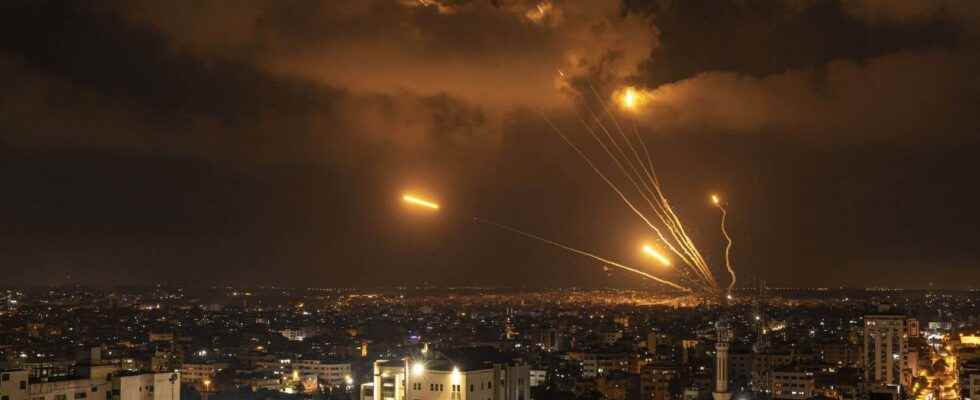Israeli forces continued to shell Gaza and the armed group Islamic Jihad sent rockets towards the Jewish state in the early hours of Saturday, the worst bout of local violence since a short war last year.
Before this last night sequence, the Israeli army had estimated to have killed 15 fighters of the Islamic Jihad in its strikes which began Friday afternoon, targeting in particular sites of manufacture of weapons, according to it. The Ministry of Health in Gaza reported ten dead, “including a five-year-old girl”, and 75 injured.
This is the worst confrontation between the Jewish state and armed organizations in Gaza since the eleven-day war in May 2021, which left 260 dead on the Palestinian side, including combatants, and 14 dead in Israel, including a soldier, according to local authorities.
The Al-Quds brigades, the armed wing of Islamic Jihad, said they launched “more than a hundred rockets” on Israeli soil on Friday as a “first response” to Israeli strikes that killed one of the group’s leaders, Tayssir Al-Jabari. .
In Israel, warning sirens continue to sound in southern localities, but no casualties or damage have been identified by the rocket fire, the army reported.
It reported 70 projectiles fired from Gaza, eleven of which landed inside the Palestinian enclave under Israeli blockade.
The remaining rockets were intercepted by the Israeli missile shield or fell in uninhabited areas in Israel.
Egypt, a historic intermediary between Israel and armed groups in Gaza, is working to mediate and could host an Islamic Jihad delegation this Saturday, Egyptian officials told AFP in Gaza. Egyptian diplomacy had previously indicated that it was conducting discussions “relentlessly in order to calm the situation and preserve lives and property”.
“Preemptive Attack”
The Jewish state presented the raids as a “preemptive attack” against Islamic Jihad, days after the arrest of a leader of the organization in the occupied West Bank who had raised fears of retaliatory actions, said a security official. Israeli military spokesman, Richard Hecht.
“Israel conducted a precise counterterrorism operation against an immediate threat,” Israeli Prime Minister Yair Lapid said on television. “Islamic Jihad is a proxy for Iran that wants to destroy the State of Israel and kill innocent Israelis. (…) We will do whatever it takes to defend our people,” he added.
The first salvo of strikes notably targeted a residential area in the center of Gaza City.
AFP journalists saw the injured being evacuated by the emergency services, firefighters working to put out fires and residents crowding into morgues.
“We hope the situation will not get worse,” said Abdullah Al-Arayshi, a 22-year-old resident. “We want to live. Enough wars, enough destruction. We are a generation that has lost its future.
Islamic Jihad, an organization considered terrorist by Israel, the United States and the European Union, accused the Jewish state of having “started a war”.
“The Zionist enemy started this aggression and must expect us to fight relentlessly,” said its secretary general, Ziad al-Nakhala, in an interview with Lebanese television Al-Mayadeen, in Tehran. Iranian capital.
In recent days, Israel had deployed reinforcements near the enclave of 2.3 million inhabitants, governed by the Islamists of Hamas and where Islamic Jihad is well established. Roads had been blocked and trains cancelled.
“Very dangerous climb”
In 2019, the death of an Islamic Jihad commander in an Israeli operation sparked several days of deadly exchanges of fire between the armed group and Israel. Hamas, which has fought the Jewish state in several wars since taking power in 2007, had kept its distance from the clashes.
“To our enemies, and especially to the leaders of Hamas and Palestinian Islamic Jihad, I would like to insist: your time is running out,” Israeli Defense Minister Benny Gantz said Friday.
In Ramallah in the West Bank, the Palestinian presidency condemned “Israeli aggression”. The UN envoy for the Middle East, Tor Wennesland, said he was “deeply concerned”, alarming himself in a press release of a “very dangerous escalation”.
Since 2007, Israel has imposed a strict blockade on Gaza, a micro-territory plagued by poverty and unemployment.
The Israeli army on Tuesday ordered the closure of border crossings, forcing thousands of Gazans, holders of work permits in Israel, to stay at home. This closure has slowed the delivery of diesel, needed to power the Gaza power plant.
This single plant risks ceasing to operate due to a lack of fuel, its director warned on Thursday.
Around 50 people who normally leave the enclave daily for treatment have also been affected, according to the World Health Organization (WHO).
